■The 23rd START Program (Taiwan)
For two weeks from March 8, 2015 to March 22, 17 first-year undergraduate students took part in the 23rd START Program. Led by Associate Professor Naoki Maeda (Graduate School of Social Sciences) and 2 other faculty members, the students went to the National Chengchi University in Taipei, Taiwan.
Divided into three classes, the participants attended Chinese language lessons and listened to lectures on “Japan-Taiwan relations”, “Taiwanese history”, and “Human rights”. Furthermore, together with students from the National Chengchi University, the START participants visited the Deng Nan-jung Memorial Museum, the 228 Memorial Museum and the Chiang Kai-shek Memorial Hall and the Palace Museum.
On the weekend, they took the Taiwan High Speed Rail (Shinkansen) and travelled to Tainan and Kaohsiung. In Tainan, they visited Anping Tumulus and the National Museum of Taiwan Literature and learned a lot about the history and culture of Taiwan. In Kaohsiung, they went to the Dragon Tiger Tower and the Ruifeng Night Market, enabling students to experience Taiwan outside of Taipei.
On the last day, the START students split into 5 groups and held 10 minute long group presentations about Taiwan. Feeling how difficult it is to make conclusions and publish contents, they had prepared themselves properly and gave high quality group presentations, incredibly well done for first-year undergraduate students.
For many of the students the START program to Taiwan was their first opportunity to learn Chinese language, but they prepared and reviewed the contents properly. Using what they learned at school for shopping or other activities in daily life, their Chinese improved day to day. Learning Chinese made them feel the importance of studying foreign languages, and at the follow-up session many students showed their high motivation saying: “I want to continue studying foreign languages.” Others commented: “At the beginning I was a little bit afraid because it was my first time to go abroad, but I would like to study abroad again.” Or “I realized the importance of acting proactively on my own initiative. I would like to use this experience for my future student life.” The experiences they got through this START program helped them to strive for their goals and to take on new challenges.
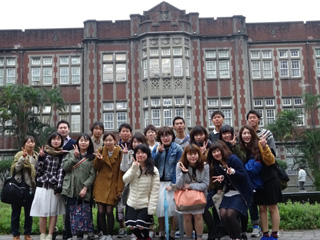 Group picture at the National Taiwan Normal University |
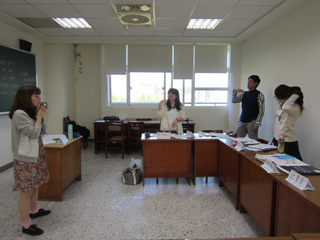 A Chinese language lesson |
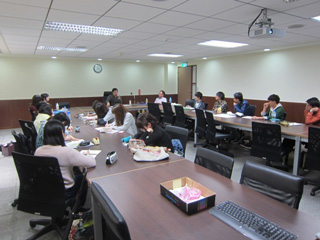 Lecture at National Chengchi University |
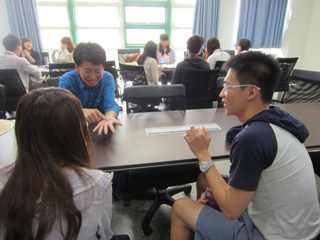 Exchange with students of the National University of Kaohsiung |
■The 24th START Program (New Zealand)
30 undergraduate first-grade students took part in the 24th START Program* for a period of two weeks from March 13 to March 30, 2015. Led by Associate Professor Aiko Morita (Graduate School of Education) and 2 other faculty members, the students were dispatched to the Faculty of Education, University of Auckland located in Auckland, New Zealand.
Divided into 3 groups, students took lessons almost every day mainly on English vocabulary, expressions, pronunciation and grammar with three teachers in charge. The students attended participation-type lectures on history, education and culture of New Zealand held by the teachers of the University of Auckland. Together with local students, they also listened to the regular lectures on the City Campus of the university. Although many of them felt some hesitation in classes taught in English, as they learned the importance of asking questions and behaving positively, the classroom gradually became animated. When they held a group presentation at the end of the program, each group displayed their achievements attained through the previous learnings before departure and the questionnaire surveys intended for local students and their host families. The quality of their presentation was great enough to impress the teachers of the University of Auckland. The participants also visited an elementary school where they made a presentation on Japanese culture. As far as extracurricular lessons are concerned, they visited museums, a dormant volcano, and a historical pioneer village, which is known for having the appearance of the pioneer days. Not only that, they experienced the history and culture of New Zealand from farms to coastal areas in the suburb of Auckland.
As in the previous START program, all of the students lived with different families during their stay in Auckland. At the beginning some of them felt awkward and showed some anxiety in a different home environment, however, many of them could gradually improve their English abilities by using conversational expressions taught at the local class and trying to communicate positively. When they had to say goodbye to their host families, many of them were moved to tears, engraving this precious experience in their hearts.
At the follow-up session, many participants said: “I wish to take more challenges on various things, looking outside Japan than before.” “I want to continue my English study even after returning home.” Or, “I want to use this experience for my future student life”. They showed a positive attitude to use the experience from this program for their future goals and student life.
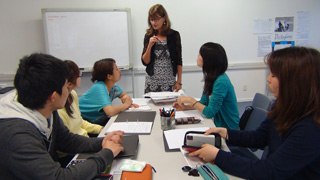 An English lesson |
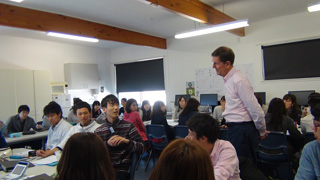 At classroom |
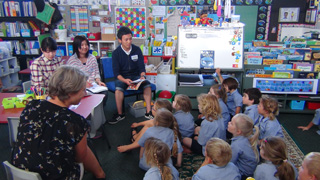 Introducing Japanese culture to elementary students |
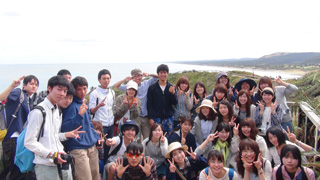 Weekend excursion to the suburb of Auckland |
* The START Program provides first year students who have little overseas experience the opportunity to attend lectures and see everyday-life at a foreign partner university in order to raise interest in international/cross-cultural activities and studying abroad. It was established in 2010 and by the end of the first semester of 2014, it has already been held 19 times. In the second semester of the academic year of 2014, HU students were dispatched 5 times, visiting America, Vietnam, New Zealand, Taiwan and Australia. The Hiroshima University Fund financially supports part of the research expenses to lessen students’ economic burden and to give a broader population of students the opportunity to study abroad. The participants went to study abroad following a two-month training period before departure. Back in Japan, they had a follow-up session.
【Inquiries】
International Exchange Group,
Education and International Office,
Hiroshima University
TEL:082-424-4346
E-mail:kokusai-ryugaku(AT)office.hiroshima-u.ac.jp
(* Please replace(AT)with @)

 Home
Home














